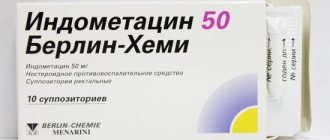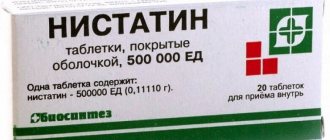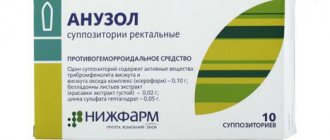The most convenient and effective form of non-steroidal drugs that have an anti-inflammatory effect are rectal suppositories. Suppositories of this group are used directly into the rectum, but in some cases in gynecology they are also used in the vagina.
Indomethacin suppositories - instructions for use in gynecology state that the drug mainly relieves pain and has an antibacterial effect. Moreover, there are many indications for use and the effect for any disease is good. Therefore, rectal suppositories with indomethacin are widely used in medicine.
Properties
Suppositories can be used both rectally and vaginally (in women). This drug, penetrating into the bloodstream, inhibits the production of prostaglandin hormones.
Their production contributes to the development of inflammation and pain. Due to the good absorption of this drug, the therapeutic effect occurs quite quickly, within the first week from the start of use.
Unlike tablets, suppositories have a great advantage when using them. They are not exposed to acids and enzymes in the gastrointestinal tract, but enter directly into the bloodstream.
Composition and properties of Indomethacin suppositories
Indomethacin is a non-steroidal drug with complex effects:
- The analgesic effect is achieved by reducing pain of various etiologies or completely relieving it.
- Reduces high temperature without affecting its normal levels.
- Relieves inflammatory processes and swelling by blocking the synthesis of prostaglandins.
- Anti-inflammatory and antipyretic effects.
Additionally, the drug helps thin the blood, which reduces the likelihood of developing thrombosis.
The active component is a derivative of indolylacetic acid - indomethacin. Additional components of suppositories are hard fat (softens the tissue surface making it susceptible to rapid absorption of indomethacin) and corn starch (provides protection for the mucous membrane and nerve endings from irritation by the drug, neutralizes acids).
Indications for use
Indomethacin suppositories are prescribed for the treatment of local and general inflammatory diseases, gynecological pathologies, neuralgia, diseases of the musculoskeletal system, acute and chronic inflammation in tissues, prostatitis.
Rectal suppositories can be used in the following cases:
- General destructive diseases of the musculoskeletal system (rheumatoid arthritis, arthritis after psoriasis, gout, spondylitis, osteochondrosis and osteoarthritis).
- To relieve pain syndromes that develop as a result of pathological processes in the human spine (sciatica, radiculitis of the lumbago type, myalgia of various etiologies).
- Bechterew's disease.
Use in women
In gynecological practice, indomethacin suppositories are used vaginally.
They give a positive effect during therapy:
- Hemorrhoids, which very often develops in the postpartum period.
- With a painful menstrual cycle (algomenorrhea).
- For the treatment of endometriosis and cystitis.
- Often this medication is prescribed along with antibacterial therapy. For the treatment of ovarian cysts, in case of threat of miscarriage, adnexitis.
Treatment methods for female diseases
Use of Indomethacin suppositories in gynecology:
- For the treatment of cystitis in women , which is often associated with hypothermia or infection from other lesions, unpleasant painful symptoms occur when urinating. In order to prevent the acute process from developing into a chronic form of the disease, it is very good to use suppositories with Indomethacin. They are prescribed 50 or 100 mg (depending on the severity of the process) before bedtime.
- Ovarian cysts also respond well to treatment with this medication, which is used as for cystitis.
- Algodysmenorrhea is a severe pain syndrome that occurs during the menstrual cycle and is associated with an increase in the level of prostaglandins in the blood. To prevent it, it is necessary to use this medicine two to three days before the onset of menstruation.
- Sometimes this remedy is prescribed during pregnancy to relieve uterine hypertonicity. In this case, suppositories can be used both rectally and vaginally at 50 mg per day.
Use in men
Indications for the use of Indomethacin in men are the treatment of chronic prostatitis, or when its seasonal exacerbation occurs.
Rectal suppositories help to positively influence the size of the prostate (reduce in size), and have a lasting, anti-inflammatory effect.
As a rule, they are prescribed to insert one suppository into the anus in the morning and evening.
After the first day of taking this medication, take a short break, during which the body’s reaction to the tolerance of this drug is determined.
If side effects or allergic reactions occur, the administration of suppositories is stopped.
Indomethacin suppositories, compared with other pharmacological forms, have the following advantages:
- In terms of action, the rate of development of the therapeutic effect is equal to parenteral administration.
- There is a prolonged effect on the source of the disease.
- The biological activity of the drug reaches 90%.
- Bypassing the gastrointestinal tract, it does not have a direct effect on it.
When prescribing them, you must strictly follow all the instructions prescribed by the doctor.
Use during pregnancy and breastfeeding
- In the first trimester of pregnancy, the use of this dosage form is undesirable, because it is at this stage that the internal organs of the future newborn develop. And the use of this medicine can cause developmental pathologies in the baby.
- The second trimester of pregnancy is an exception, and in case of a threat to the health of the mother, short-term use of this drug is allowed.
- In the third trimester , the fetal circulatory system is formed; therefore, suppositories with Indomethacin are not prescribed.
- In the postpartum period and lactation, indomethacin suppositories are allowed to be taken if breastfeeding is interrupted during their use.
Release forms: vaginal and rectal suppositories
Indomethacin suppositories have a white (with a yellowish tint) color and an oblong (torpedo-shaped) shape. Each suppository contains 50 mg or 100 mg of the active ingredient.
The advantages of using the drug in the form of suppositories are:
- local effect directly on the cause of pain/inflammation;
- direct entry of the drug into the blood without negative effects on the digestive tract;
- begin to act 15 minutes after application;
- relatively low cost.
Maximum effectiveness after taking the medicine is achieved after 1.5-2 hours. The therapeutic effect lasts for 4-8 hours. Removal of drug residues is carried out by the kidneys after 4.5-9 hours.
The drug is taken rectally to relieve pain/fever or inflammation of various etiologies. It is possible to use indomethacin vaginally for gynecological diseases. The appropriate treatment method is chosen by the gynecologist after diagnosing the disease.
Use in childhood
Indomethacin in any pharmacological forms is not prescribed for children under 14 years of age.
Elderly age
People try not to prescribe this dosage form in old age. Since it can provoke an exacerbation of old chronic processes and cause unpredictable side effects.
Most often, when this drug is prescribed, it is used in tablet form. This is due to the fact that when they are taken, the effect occurs smoothly.
Suppositories, bypassing the stomach, immediately enter the bloodstream and have an almost instant effect. But for older people this is unacceptable.
Contraindications
This dosage form has strict contraindications for which this drug is not prescribed:
- Hypersensitivity to any component of this medicine.
- The presence of a peptic ulcer in the stomach or intestines (during an exacerbation).
- First and third trimester of pregnancy. Breastfeeding period.
- Pathologies of the hematopoietic organs.
- Chronic pancreatitis in severe form.
- Advanced forms of hypertension and heart disease.
- Serious diseases that cause problems with the kidneys and liver.
- Intestinal bleeding and proctitis.
- Children under 14 years of age.
- In cases where the patient has diseases that are accompanied by damage to the auditory or optic nerve.
- Congenital cardiac pathologies that cause changes in the pulmonary and coronary arteries.
Side effects
Despite relatively good tolerability, patients may experience undesirable consequences; they can develop in various organs and systems of the human body.
Description of the following pathological processes:
- The digestive system may respond with nausea, vomiting, pain in the epigastric region, increased gas formation in the intestines, stomach or intestinal bleeding. Very rarely, stomatitis, gastritis, and intestinal stricture can develop.
- On the part of the nervous system , headaches, loss of strength, psycho-emotional state disorder, an unreasonable feeling of increasing anxiety may be observed, and in very rare cases, convulsions, paresthesia, uncontrolled muscle movements, and mental disorders occur.
- In the cardiovascular system, sharp jumps in blood pressure may occur, chest pain may appear, arrhythmia and tachycardia may occur, and swelling of the lower extremities may occur.
- In the hematopoietic organs, changes are quite rare and manifest themselves in the form of leukopenia, petechiae, thrombocytopenia or disseminated intravascular coagulation syndrome.
- Sometimes allergic reactions may occur , which manifest themselves in the form of urticaria, dermatitis, erythema multiforme, hair loss, anaphylactic reactions, and pulmonary edema.
- In the sensory organs, blurred vision, deafness, and tinitis may occur.
- The urinary system suffers very rarely from the side effects of this drug. Sometimes the patient may develop nephrotic syndrome and proteinuria.
- On the part of metabolic processes, the appearance of glucosuria, increased blood sugar, and hyperkalemia may be observed.
- Women very rarely may experience signs of gynecomastia, vaginal and nosebleeds, increased sweating, and enlarged mammary glands.
- Exacerbation of chronic colitis and irritation of the rectal mucosa are also possible.
Features of the use of suppositories during pregnancy and lactation
Indomethacin suppositories instructions for use in gynecology prohibit use during pregnancy. But many obstetricians and gynecologists prescribe it due to its rapid effect.
Indomethacin is prescribed for use when:
- Increased uterine tone to maintain pregnancy. Indomethacin has a blocking effect on prostaglandin hormones that cause contractions of the uterine muscles.
- To prevent premature birth.
The drug is prescribed with caution and if the therapeutic effect outweighs all possible risks. The optimal time for taking indomethacin is considered to be the 2nd-3rd trimester in the period from 18 to 32 weeks.
The drug penetrates the placenta and can cause a number of pathologies (impaired formation of the circulatory system) up to intrauterine fetal death. Therefore, in the 1st and late 3rd trimester, during the active formation of the child’s main organs and systems, indomethacin is strictly contraindicated.
During lactation, women are not recommended to use the drug.
It is better not to use indomethacin suppositories during breastfeeding.
The medicine passes into breast milk and, due to its toxicity, can cause disturbances in the functioning of the child’s internal organs and slow down proper development. If indomethacin therapy is absolutely necessary, the child should be transferred to artificial feeding.
In case of complicated childbirth, abortion or caesarean section, an obstetrician-gynecologist may prescribe Indomethacin suppositories as a comprehensive treatment for the rapid recovery of the female body.
When planning pregnancy, it is also recommended to refrain from using indomethacin. During administration, this drug has the ability to accumulate in the body. Complete elimination requires 1 month from the date of the last dose of the drug.
Dosage and method of administration
Indomethacin suppositories are inserted directly into the rectum. To do this, before the injection procedure you need to:
- Cleanse the intestines.
- Wash your hands and treat with a cotton swab soaked in alcohol.
- Remove the suppository from the plastic blister and insert the pointed end into the rectum.
The maximum dosage per day for adult patients is three suppositories, 50 mg each. For children over 14 years of age, this manipulation can be performed once a day in a volume of no more than 50 grams.
Suppositories with a dosage of 100 mg are used once a day. In case of an acute attack of gout, a daily dose of up to 200 mg is acceptable.
When used once a day, rectal suppositories are best used before bedtime.
If a woman is prescribed vaginal use of suppositories, this procedure must be performed in the following order:
- Carry out high-quality washing of the external and internal genital organs.
- Treat your hands with an antiseptic or alcohol-containing solution, applying it to cotton wool, thoroughly wipe your palms and nail phalanges.
- Carefully open the package and take out the candle (the manipulation must be done quickly, since the candle melts in your hands), take a lying position and insert it deep into the vagina.
As a rule, this procedure is best done before bed. Then all bioactive substances will be maximally absorbed into the woman’s body.
If the dosage of this drug is not observed and it is taken in increased doses, symptoms of intoxication may develop. The patient experiences nausea, vomiting, loose stools, migraine, and spatial disorientation.
When such signs appear, it is necessary to perform gastric lavage and drink drugs from the enterosorbent group (Sorbex, Activated Carbon, Atoxyl, Polysorb) . And be sure to visit a doctor.
Causes and consequences of muscle tone
Muscle tone is a condition when the muscle tissue of the uterus is under prolonged tension. The uterus can contract several times a day every day due to physiological manifestations - with sneezing, fear and excitement, laughter, with a sudden change in body position, during orgasm.
But the resulting tone is short-term in nature and does not pose a threat. But when the uterine muscles are in a contracted state and constantly contract for a long time, an increase in pressure in the uterus is observed. This is considered a serious pathology that requires immediate treatment.
The causes of hypertension can be:
- strong physical activity (heavy lifting, overwork);
- dysfunction of the nervous system (stress, overexcitation, anxiety);
- hormonal imbalance (high testosterone and low progesterone). Timely hormonal therapy will help quickly restore the hormonal levels of a pregnant woman;
- discrepancy between the Rh factors of the parents. A woman’s body can accept an embryo as a foreign cell, as a result of which the uterus becomes toned to get rid of the embryo;
- toxicosis in the early stages of pregnancy (vomiting causes contraction of the stomach and strong compression of the uterus, causing hypertonicity);
- adhesions, scars in the uterus formed as a result of previous surgical interventions, abortions, inflammations;
- structural features of the uterus (“bicornuate” shape, bend) can cause failure to carry a child due to constant hypertonicity;
- multiple pregnancy, polyhydramnios or previous births lead to severe stretching of the uterine muscles, resulting in constant spasmodic contractions;
- frequent, active sexual intercourse;
- constipation, increased gas formation;
- dysfunction of the thyroid gland;
- past viral and colds (sore throat, acute respiratory infections, influenza);
- the presence of sexually transmitted diseases (chlamydia, gonorrhea, syphilis, ureaplasmosis);
- bad habits (drinking alcohol and drugs, smoking).
The consequences of muscle tone during pregnancy can be:
- Miscarriage in the early stages (before 28 weeks) or fading of pregnancy.
- Late premature birth.
Constant hypertension can negatively affect the health of the unborn child. When the uterus contracts, the fetus experiences oxygen starvation, as a result of which the blood supply is disrupted. This leads to abnormalities in the child.
If unpleasant symptoms appear, a pregnant woman should immediately contact her treating gynecologist. Timely medical care and health monitoring throughout pregnancy (routine tests, doctor's appointments, ultrasound examinations) will help you carry and give birth to a healthy baby.
Interaction
- When combining this drug with beta-blockers and saluretics , a decrease in their effectiveness may be observed.
- When taken simultaneously with indirect anticoagulants , their effect is significantly increased.
- You should not prescribe drugs containing Indomethacin; together with Diflunisal, this can lead to the development of gastric bleeding.
- When used in combination with Probenecid, it is possible to enhance the drugs of the Indomethacin group.
- When combined with Cyclosporine, its toxicity sharply increases.
- If you use Digoxin and Indomethacin suppositories at the same time , it is possible to increase the concentration of Digoxin in the bloodstream, this leads to an increase in its effect.
Overdose
It is advisable to use Indomethacin suppositories in a minimal amount, in no case exceeding the dosage.
Otherwise, the following overdose effects may occur:
- severe vomiting and constant nausea;
- dizziness and disorientation in space;
- migraine or severe headache;
- temporary memory impairment.
With long-term treatment with the drug using large doses, the effect of an overdose will be:
- numbness of hands and feet;
- severe cramps;
- paresthesia.
If you have symptoms of an overdose, you should immediately stop taking the drug and consult a doctor for symptomatic treatment. In this case, self-medication is absolutely not worth it.
Analogs
It is necessary to understand what an analogue of this drug is. Pharmaceutical manufacturers and doctors use this name to mean drugs that are similar in chemical structure and composition.
But the correct name for these dosage forms will be considered generics, or synonyms (pharmacological copies of the drug).
Substitutes include medicinal substances that have identical effects. They may belong to the same or different pharmacological groups, be monocomponent, or combined with other dosage forms.
They may also have different chemical structures.
The most common, accessible analogues can be considered:
- Methindol . Produced in Poland. It is considered an expensive analogue of Indomethacin suppositories. The average price ranges from 150 to 200 rubles.
- Indomethacin suppositories from Sopharma are produced in Bulgaria and have a relatively cheap price from 85 to 100 rubles.
- Indomethacin in various dosage forms is produced in Russia by Altpharma. Its main advantage is that it is well tolerated by patients; it does not have many contraindications and side effects. The average price of suppositories does not exceed 120 rubles. for 10 pieces, dosage of 100 milligrams.
- Indobene. Produced in Austria, it has a relatively low price, up to 200 rubles .
Methindol
Indomethacin Sopharma
Indomethacin Altfarm
Indobene
These analogues are very similar in chemical structure; their main component is Indomethacin.
If individual intolerance to it occurs, or an allergic reaction develops, this means that this drug must be replaced with an analogue that will be comparable in action to Indomethacin.
Such medications include:
- Ibuprofen. Manufacturer: Darnitsa. It has become widespread in the treatment of not only adults, but also children. Available in various dosage forms. The number of side effects is much lower than that of other similar drugs. The average price does not exceed 100 rubles.
- Butadion . A very once popular drug, but due to the fact that it has a lot of side effects, it is not prescribed so often at this time
- Diclofenac. Rectal forms of this drug are very well tolerated by patients and have a minimum of side effects. The average price can range from 10 to 20 rubles. Suppositories containing Diclofenac are sold in pharmacies under the name Dicloberl or Diclovit. They are very similar in pharmacological action, but differ in price.
Despite the fact that Indomethacin suppositories have many analogues, it should be remembered that they all have side effects and contraindications. This is why you should not engage in individual selection and prescribe your own medicine. To do this, you need to go to the clinic.
Indomethacin or Diclofenac – which is better?
Manufacturer: Akrikhin, Altfarm, Dalkhimfarm, Obolenskoye, Sintez (Russia), Hemofarm (Serbia), Teva (Israel), Rompharm Company (Romania).
Release form: tablets, solution for intramuscular injection, ointment, gel, eye drops, rectal suppositories
Active ingredient: diclofenac sodium
Analogues: Voltaren, Ortofen, Diclak, Diclovit, eye drops Diclof-f
Diclofenac is an analogue from the NSAID group with an anti-inflammatory effect that is not inferior in strength to Indomethacin. Quickly relieves severe pain. It is the most commonly used drug in the world. The many forms of release of the Diclofenac analogue indicate its effectiveness and versatility in use for patients with different diagnoses.
Indications:
- articular syndrome;
- pain syndrome;
- postoperative inflammation;
- inflammation and swelling of soft tissues due to sprains, bruises (closed injuries);
- treatment and prevention of eye inflammation - in the form of eye drops.
If the patient has contraindications for oral administration of NSAIDs, a suppository dosage form is used. An analogue of Indomethacin in suppositories is Diclofenac. Bioavailability after rectal administration is 50%, the maximum level of the active substance is detected in plasma after half an hour. If necessary, Diclofenac suppositories are combined with tablets for oral administration.
The drug has age restrictions: 50 mg suppositories are allowed from 14 years of age, 100 mg - from 18 years of age; tablets 50 mg - from 15 years old, 100 mg - from 18 years old.
An analogue of Indomethacin ointment is Diclofenac with a concentration of 1 and 2%, used in children from 6 years of age. The trade name Ortofen also has the active ingredient diclofenac sodium. Available in the form of 2% ointment, 5% gel and 25 mg tablets. The choice of dosage form depends on the intensity of pain.
An analogue of Indomethacin eye drops is a drug with the trade name Diclofen based on diclofenac sodium. It is used in ophthalmology to treat eye inflammation after injuries, operations, infectious and non-infectious processes.
Taking the Diclofenac analogue is easier to tolerate by patients than Indomethacin therapy. However, long-term use will also lead to a deterioration in clinical indicators of liver function.
The choice of an analogue should be entrusted to the attending physician. Only a good specialist will take into account the nuances of using medications in relation to a specific patient.
special instructions
Special instructions for use:
- Candles may become too soft when left in a warm room, so they should be immersed in cold water or placed in the refrigerator before use. Only after this is it possible to use them.
- For ease of use, they can be moistened with water , this will facilitate deeper penetration into the lumen of the rectum.
- Before the procedure, it is necessary to cleanse the intestines using a microenema or a rubber bulb . When inserting a suppository, it is best to take a position lying on your left side. After inserting rectal suppositories, you need to lie down for 30 minutes, this will allow better absorption of the medicine.
- It is advisable to undergo a complete examination when using this medicine. If the patient has acute or chronic processes, then the doctor must be informed about this.
- In cases where pain appears in the intestines , or in the area of the prostate gland, which is accompanied by itching, it is best to discontinue the use of rectal suppositories. Or consult a doctor who will prescribe another drug or reduce the dose of the drug.
- When using suppositories, both rectally and vaginally, it is necessary to monitor the functioning of the kidneys and liver. With extreme caution, this drug is prescribed to patients suffering from cardiovascular pathologies, as well as diseases of the stomach and intestines, and to patients with ulcerative colitis.
- Extremely careful, the drug is prescribed in old age. This is explained by the fact that patients may experience side effects that are severe.
- After using candles, you must wash your hands thoroughly with soap and water. This will prevent this medication from getting into your eyes or mouth. If this does happen, you need to rinse your eyes under running water.
- During therapy with this medication, you should not drink alcoholic beverages . When they are combined, unpredictable side processes may develop. Alcohol may reduce the effectiveness of treatment with this drug.
- Indomethacin suppositories may have a negative effect on psychomotor reactions , which means that it is better to refrain from driving while using them.
- If the work involves increased concentration , then it is best to take sick leave and stay at home during therapy.
- Urologists do not recommend using the medicine in a dose that exceeds 200 milligrams per day.
How to use Indomethacin?
The dose is set individually. Typically, the initial dose for an adult is 50 mg; at this dosage, suppositories can be given 2 pieces per day. An alternative treatment regimen is the administration of 100 mg (one suppository in the appropriate dosage) once a day. In severe cases, the use of 3 suppositories/50 mg at regular intervals is allowed. For gouty arthritis in the acute phase, for gout of the legs, you can use 200 mg/day - for 2 injections of 100 mg.
The drug is administered rectally only after bowel movements and thorough washing of the anal area.
For vaginal administration, the dosages will be similar, but this method is not prescribed in the instructions and should be discussed with your doctor.
More often, even for gynecological diseases, rectal use of suppositories is practiced. The course of therapy should be as short as possible; usually 3-7 days are enough to achieve a clinical result. On the recommendation of a doctor, the course can last up to 14-28 days.
Storage
The temperature regime is very important when storing rectal and vaginal suppositories; it should not exceed 25 degrees Celsius. They are usually stored in the refrigerator.
It is very important to avoid direct sunlight. The storage location must be inaccessible to children. The period of use of this dosage form ranges from 3 to 6 years.
This medicine in capsules and suppositories is available at the pharmacy only upon presentation of a prescription. No prescription is required when purchasing the ointment.
Indomethacin or Ibuprofen – which is better?
Manufacturer: Akrikhin, Biokhimik, Vertex, Medisorb, Ozone, Synthesis, Tatkhimfarmpreparaty, Ecolab (Russia), Borisov plant (Belarus)
Release form: tablets, capsules, suspension, suppositories, gel, ointment
Active ingredient: ibuprofen
Analogs: Nurofen, MIG 400, Faspik, Brufen, Dolgit
Indomethacin analogue Ibuprofen is an NSAID with a pronounced analgesic and antipyretic effect. But its anti-inflammatory effect is lower.
Benefits of Ibuprofen:
- favorable safety profile even with long-term use in high doses;
- large selection of dosage forms and dosages;
- in the form of a suspension, it is allowed for children from 3 months;
- over-the-counter;
- the analogue is cheaper than Indomethacin. Domestic Ibuprofen with a dosage of 200 mg can be purchased at a price of 17 ₽ for 20 tablets.
Ibuprofen is used as an analgesic. Relieves toothache, headache, migraine, back pain, muscle pain, reduces temperature during colds.
Which analogue (Ibuprofen or Indomethacin) will be more effective in coping with emerging symptoms depends on the individual patient, his medical history, age, and concomitant diseases.
Medicines from the NSAID group are often used in medical practice. However, the prescription of most drugs warns against uncontrolled use of the group, since the consequences of use can be harmful and aggravate the problem.








